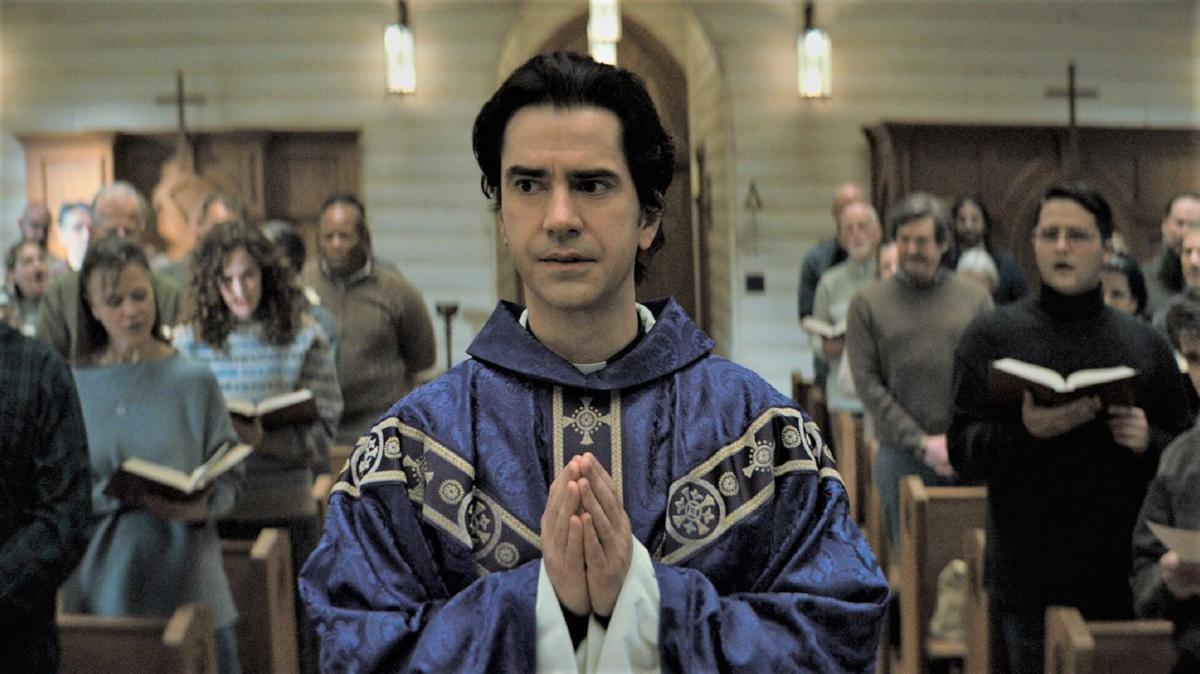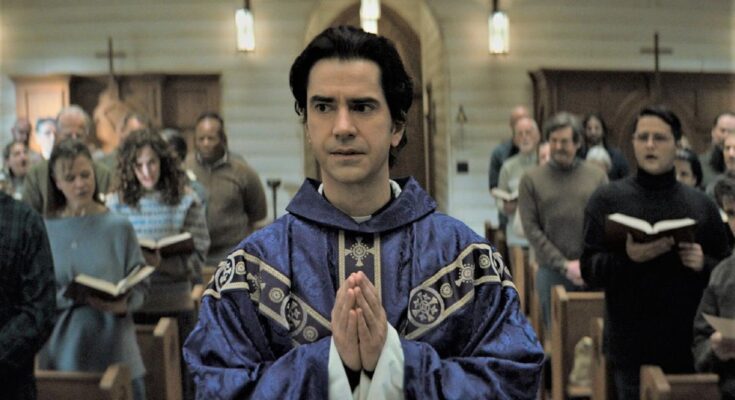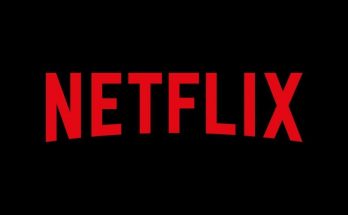
The marriage of Mike Flanagan and Netflix has been a stellar one so far. The filmmaker delivered a wonderful Stephen King adaptation in Gerald’s Game, lit the streaming world on fire with The Haunting of Hill House, and gave gothic romance a much-needed spotlight in The Haunting of Bly Manor. Flanagan’s work with Netflix — along with his popular Doctor Sleep adaptation — has made him one of the biggest names in modern horror, and set the bar for his next project impossibly high. That project is Midnight Mass, a TV series that Flanagan concocted long before making Hill House, and it somehow exceeds even the loftiest of expectations. With a complicated and thought-provoking exploration of religion, Flanagan turns in what is easily the strongest work of his career.
Midnight Mass tells the story of a northeastern island community known as Crockett Island, where everybody knows everybody and the majority of the town attends the same church, St. Peters. On the day when the church’s elderly priest, Monsignor Pruitt, is supposed to return from a trip to Israel, a younger man of the cloth returns in his place, explaining that Pruitt fell ill and that he’ll be taking over until the old man returns. Father Paul (Hamish Linklater) brings a new energy to the island, along with unexplainable miracles, slowly causing the congregation to attach themselves to his every word. It’s clear right away that this young priest harbors some dangerous secrets, but the idea of faith blinds most of the town’s residents to various warning signs.
There are so many other stories being told throughout Midnight Mass, and most of the major characters have their own individual tales that are every bit as interesting as the larger narrative. The town black sheep (Zach Gilford) returns from prison after serving a four-year sentence for killing a young girl in a drunk driving accident. His high school sweetheart (Kate Siegel) is pregnant and trying to figure out how to be a better mother than she had. There’s the town’s new sheriff (Rahul Kohli), a Muslim who finds himself often judged by the island’s inhabitants. Each of these characters is fully realized and thoroughly lived in, but their stories all have a part to play in the bigger picture.
That bigger picture is one of faith and wickedness; of love and hate. There are two sides to every coin, and that’s where Flanagan really finds ways to dig into the ideas of religion and the role it plays in society. Oftentimes in horror (and sadly, in our real world), the most wicked acts are committed in the name of faith, particularly the Christian faith here in America. That evil, however, usually stands in direct opposition to what those beliefs are supposed to be about. Religion, over time, has created evil. But the ideals and teachings — with the influence of corruption and extremism stripped away — are often aimed at spreading love and peace to those around you.
When you flip that coin, you’ve got an equal shot at ending up with either side, but Flanagan isn’t interested in how the coin lands. He focuses his efforts on the time the coin is hanging in the air, flipping so fast that one side isn’t discernable from the other. They become one and the same. Not all of the religious people in Midnight Mass are evil, despite what their leaders sometimes influence them to do. Not all of the people who don’t go to church are exempt from blame.
This is an immensely difficult line to walk, one that many have tried and many have failed to navigate. Flanagan toes it perfectly, though he gets a lot of help from his unwavering cast. Just about every single member of this ensemble is an absolute force throughout Mass. Linklater is at his best as Father Paul, and the more unhinged the character becomes, the brighter Linklater shines. Even as the terrifying presence looming over the entire series, Linklater brings a humanity to Paul that seems almost impossible to achieve. By the time his arc comes to a close, you realize that every single action taken by Linklater over the course of the seven episodes was significant and chosen for such a specific purpose. It’s the kind of performance that takes multiple viewings to really appreciate.
I could write the same kind of paragraph about every actor in this series and the masterful performances they deliver. Gilford rips your heart out and puts it back again with his portrayal of Riley Flynn. Siegel is a force of nature (as always) with a couple of deeply emotional monologues that would play on a loop in an acting hall of fame, if such a thing existed. Kohli awakened some unexpected feelings online with his sensitivity and immaculate mustache in Bly Manor (which his denim jacket and fatherly wisdom in Mass will surely intensify), but the subtleties he brings to these characters are what really deserve the attention. He’s always reserved, but never not in complete control of a scene. Annabelle Gish is a portrait of stoic grace, while Samantha Sloyan will bring out an anger in you that you may not have known existed. I could go on and on; everyone in this cast is flawless.
No matter who the character is, or how brilliantly they are played, it’s Flanagan’s treatment of them as both writer and director that brings Midnight Mass home. Empathy is the key to making it all work. As one character points out so defiantly in the finale, each person is equally loved in the eyes of God, whether they’ve spent every day in church or never attended. That’s how God views everyone, according to the Bible, and it’s how Flanagan views the residents of Crockett. No matter their sins, no matter their shortcomings, each of these characters is treated with the utmost respect and grace. The series spends time with them and lets you understand not just who they are, but how and why they got there. The camera will linger in on a character for longer than you’d expect, because the goal isn’t just to hear what they’re saying, but to watch their experience unfold so you have a better understanding of where they’re coming from.
In the hands of a lesser filmmaker, this concept might not have worked out so well. It’s easy to make the church frightening. It’s easy to call sinners “sinners.” Though Flanagan isn’t interested in determining who is righteous and who is wicked, which would’ve been simple in a world where he is the sole creator and deity. Instead of dwelling in the terrors, Midnight Mass ultimately arrives at a place of hope and light, using empathy and love as a guide through the darkness.
Rating: 5 out of 5
Midnight Mass arrives on Netflix on September 24th.



